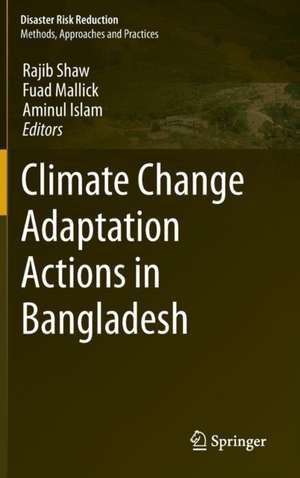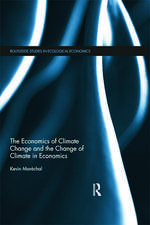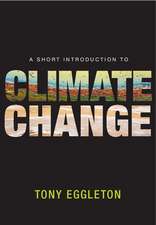Climate Change Adaptation Actions in Bangladesh: Disaster Risk Reduction
Editat de Rajib Shaw, Fuad Mallick, Aminul Islamen Limba Engleză Hardback – 13 iun 2013
The book has four parts. Part I gives the details of climate change impacts, providing the scenarios, negotiations, and specific impacts on sea-level rise and the health sectors. Part II focuses on climate change strategy and action plans. Part III covers socio-economic impacts in terms of economic and environmental costs. Part IV focuses on adaptive actions for agriculture, livelihoods, and integrated approaches in agriculture and fisheries. Part V deals with climate-change governance issues.
The primary target groups for this book are students and researchers in the fields of environment, disaster risk reduction, and climate change studies. The book will provide them with a good idea of the current trend of research in the field and will furnish basic knowledge on this important topic in Bangladesh. Another target group comprises practitioners and policy makers, who will be able to apply collective knowledge to policy and decision making.
| Toate formatele și edițiile | Preț | Express |
|---|---|---|
| Paperback (1) | 647.08 lei 43-57 zile | |
| Springer – 15 iul 2015 | 647.08 lei 43-57 zile | |
| Hardback (1) | 651.99 lei 43-57 zile | |
| Springer – 13 iun 2013 | 651.99 lei 43-57 zile |
Din seria Disaster Risk Reduction
- 18%
 Preț: 796.61 lei
Preț: 796.61 lei -
 Preț: 394.30 lei
Preț: 394.30 lei - 18%
 Preț: 790.46 lei
Preț: 790.46 lei - 15%
 Preț: 654.12 lei
Preț: 654.12 lei - 18%
 Preț: 967.08 lei
Preț: 967.08 lei - 24%
 Preț: 640.27 lei
Preț: 640.27 lei - 18%
 Preț: 1009.16 lei
Preț: 1009.16 lei - 18%
 Preț: 890.54 lei
Preț: 890.54 lei - 18%
 Preț: 942.94 lei
Preț: 942.94 lei - 15%
 Preț: 646.30 lei
Preț: 646.30 lei - 18%
 Preț: 782.24 lei
Preț: 782.24 lei - 18%
 Preț: 898.75 lei
Preț: 898.75 lei - 18%
 Preț: 956.33 lei
Preț: 956.33 lei - 18%
 Preț: 947.50 lei
Preț: 947.50 lei - 15%
 Preț: 643.34 lei
Preț: 643.34 lei - 24%
 Preț: 921.07 lei
Preț: 921.07 lei - 18%
 Preț: 951.91 lei
Preț: 951.91 lei - 18%
 Preț: 894.97 lei
Preț: 894.97 lei - 15%
 Preț: 641.85 lei
Preț: 641.85 lei - 24%
 Preț: 639.86 lei
Preț: 639.86 lei - 18%
 Preț: 790.14 lei
Preț: 790.14 lei - 18%
 Preț: 729.18 lei
Preț: 729.18 lei - 18%
 Preț: 784.13 lei
Preț: 784.13 lei - 18%
 Preț: 783.50 lei
Preț: 783.50 lei - 18%
 Preț: 784.48 lei
Preț: 784.48 lei - 24%
 Preț: 698.99 lei
Preț: 698.99 lei - 15%
 Preț: 642.18 lei
Preț: 642.18 lei - 15%
 Preț: 651.51 lei
Preț: 651.51 lei - 18%
 Preț: 943.57 lei
Preț: 943.57 lei - 15%
 Preț: 649.54 lei
Preț: 649.54 lei - 24%
 Preț: 690.45 lei
Preț: 690.45 lei - 24%
 Preț: 899.52 lei
Preț: 899.52 lei - 18%
 Preț: 962.27 lei
Preț: 962.27 lei - 15%
 Preț: 652.17 lei
Preț: 652.17 lei - 15%
 Preț: 646.75 lei
Preț: 646.75 lei - 20%
 Preț: 587.28 lei
Preț: 587.28 lei - 15%
 Preț: 647.40 lei
Preț: 647.40 lei - 18%
 Preț: 957.75 lei
Preț: 957.75 lei
Preț: 651.99 lei
Preț vechi: 767.05 lei
-15% Nou
Puncte Express: 978
Preț estimativ în valută:
124.75€ • 130.61$ • 103.23£
124.75€ • 130.61$ • 103.23£
Carte tipărită la comandă
Livrare economică 07-21 aprilie
Preluare comenzi: 021 569.72.76
Specificații
ISBN-13: 9784431542483
ISBN-10: 4431542485
Pagini: 432
Ilustrații: IX, 420 p.
Dimensiuni: 155 x 235 x 29 mm
Greutate: 0.74 kg
Ediția:2013
Editura: Springer
Colecția Springer
Seria Disaster Risk Reduction
Locul publicării:Tokyo, Japan
ISBN-10: 4431542485
Pagini: 432
Ilustrații: IX, 420 p.
Dimensiuni: 155 x 235 x 29 mm
Greutate: 0.74 kg
Ediția:2013
Editura: Springer
Colecția Springer
Seria Disaster Risk Reduction
Locul publicării:Tokyo, Japan
Public țintă
ResearchCuprins
Climate Change: Global Perspective.- Climate Change Impacts, Scenario and Vulnerability of Bangladesh.- Sea Level Rise and its Impacts in Coastal Areas of Bangladesh.- Urban Poverty, Climate Change and Health Risks for Slum Dwellers in Bangladesh.- Integration of Climate Change Adaptation, Disaster Risk Reduction and Social Protection in Bangladesh: Contemporary Views and Experiences.- National Adaptation Programme of Action.- Bangladesh Climate Change Strategy and Action Plans.- Multi Hazard Vulnerabilities of the Coastal Land of Bangladesh.- Equity and Justice Issues for Climate Change Adaptation in Water Resource Sector.- Gender and climate change: Impacts and coping mechanisms of women and special vulnerable groups.- Agriculture Adaptation in Haor Basin.- Agriculture Adaptation in Coastal Zone of Bangladesh.- Livelihood Adaptation in the Drought Prone Areas.- Coastal Livelihood Adaptation in Changing Climate: Bangladesh Experience of NAPA PriorityProject Implementation.- Coastal Ecosystem based Adaptation: Bangladesh Experience.- Adaptation Technologies in Practice and Future Potentials in Bangladesh.- Habitat and Infrastructures: A Localized Approach to Resilience.- Community Based Adaptation: Theory and Practice.- Bangladesh Climate Public Expenditure and Institutional Review.- Planning “Exceptionalism”? Political Economy of Climate Resilient Development inBangladesh.
Notă biografică
Rajib Shaw
Rajib Shaw is an Associate Professor in the Graduate School of Global Environmental Studies of Kyoto University, Japan. He worked closely with the local communities, NGOs, governments and international organization, including United Nations, especially in the Asian countries. He is currently the Chair of the United Nations Asia Regional Task Force for Urban Risk Reduction, and the President of Asian University Network of Environment and Disaster Management (AUEDM). His research interests are: community based disaster risk management, climate change adaptation, urban risk management, and disaster and environmental education. He has published several books in the field of disaster and environmental management. He is also the Chief Editor of Asian Journal of Environment and Disaster Management.
Fuad Mallick
Fuad Hassan Mallick is the Professor and Chairperson of Department of Architecture and Director of the Postgraduate Programs in Disaster Management (PPDM) at BRAC University. He did pioneering research on thermal comfort for Bangladesh and published extensively on it. He is the founder of the department of architecture of BRAC university and the author of its curriculum. He is also the founder director of the university’s Post Graduate Programs in Disaster Management, the first of its kind in the region. Fuad’s research background is on environmental aspects of architectural design, low income and rural housing,architectural education and in the last few years disaster management and climate change. He has written book chapters and published journal articles on disaster management and climate change issues. He has been a reviewer for the Aga Khan Award for Architecture and a member of Aga Khan Education Program’s thinking group for conceptualizing a School of Architecture and Human Settlements for the Aga Khan University. He is the Vice President of the Asian Universities Network for Environment and Disaster Management (AUEDM).
Aminul Islam
M. Aminul Islam is specialized in climate change, environment and disaster management and contributed as an academic, researcher, practitioner, manager and policy adviser. He is associated with United Nations Development Programme since 1996 and served different positions in Bangladesh Country Office started as the Sustainable Development Adviser and served as the Assistant Country Director and lead the Climate change, Environment and Disaster Management Cluster and currently Senior Adviser. Dr. Islam also served as the Senior Technical Adviser and Team Leader of the Water Disaster Risk Reduction Project in Central Vietnam supported by UNDP Vietnam. As an academic, he taught research methodology for the post graduate programme in the Institute of Bangladesh Studies in Rajshahi University, founder Director and Associate Professor of the School of Environment Science and Management of Independent University, Bangladesh and also contributed as an Adjunct Professor of the Population Science Department in Dhaka University. He was Environmental Scientist of the Flood Action Plan’s Component 16 on Environment implemented by the ISPAN (Virginia, US based) supported by USAID.
Rajib Shaw is an Associate Professor in the Graduate School of Global Environmental Studies of Kyoto University, Japan. He worked closely with the local communities, NGOs, governments and international organization, including United Nations, especially in the Asian countries. He is currently the Chair of the United Nations Asia Regional Task Force for Urban Risk Reduction, and the President of Asian University Network of Environment and Disaster Management (AUEDM). His research interests are: community based disaster risk management, climate change adaptation, urban risk management, and disaster and environmental education. He has published several books in the field of disaster and environmental management. He is also the Chief Editor of Asian Journal of Environment and Disaster Management.
Fuad Mallick
Fuad Hassan Mallick is the Professor and Chairperson of Department of Architecture and Director of the Postgraduate Programs in Disaster Management (PPDM) at BRAC University. He did pioneering research on thermal comfort for Bangladesh and published extensively on it. He is the founder of the department of architecture of BRAC university and the author of its curriculum. He is also the founder director of the university’s Post Graduate Programs in Disaster Management, the first of its kind in the region. Fuad’s research background is on environmental aspects of architectural design, low income and rural housing,architectural education and in the last few years disaster management and climate change. He has written book chapters and published journal articles on disaster management and climate change issues. He has been a reviewer for the Aga Khan Award for Architecture and a member of Aga Khan Education Program’s thinking group for conceptualizing a School of Architecture and Human Settlements for the Aga Khan University. He is the Vice President of the Asian Universities Network for Environment and Disaster Management (AUEDM).
Aminul Islam
M. Aminul Islam is specialized in climate change, environment and disaster management and contributed as an academic, researcher, practitioner, manager and policy adviser. He is associated with United Nations Development Programme since 1996 and served different positions in Bangladesh Country Office started as the Sustainable Development Adviser and served as the Assistant Country Director and lead the Climate change, Environment and Disaster Management Cluster and currently Senior Adviser. Dr. Islam also served as the Senior Technical Adviser and Team Leader of the Water Disaster Risk Reduction Project in Central Vietnam supported by UNDP Vietnam. As an academic, he taught research methodology for the post graduate programme in the Institute of Bangladesh Studies in Rajshahi University, founder Director and Associate Professor of the School of Environment Science and Management of Independent University, Bangladesh and also contributed as an Adjunct Professor of the Population Science Department in Dhaka University. He was Environmental Scientist of the Flood Action Plan’s Component 16 on Environment implemented by the ISPAN (Virginia, US based) supported by USAID.
Textul de pe ultima copertă
The book outlines the climate change adaptation (CCA) actions in Bangladesh drawing examples and lessons from different projects and programs in the country. The content is based on a selection of available documents, a consultative workshop with the academicians from different universities undertaking higher education on disaster risk reduction and climate change adaptation, and the editors’ own knowledge and experience in the field.
The book has four parts. Part I gives the details of climate change impacts, providing the scenarios, negotiations, and specific impacts on sea-level rise and the health sectors. Part II focuses on climate change strategy and action plans. Part III covers socio-economic impacts in terms of economic and environmental costs. Part IV focuses on adaptive actions for agriculture, livelihoods, and integrated approaches in agriculture and fisheries. Part V deals with climate-change governance issues.
The primary target groups for this book are students and researchers in the fields of environment, disaster risk reduction, and climate change studies. The book will provide them with a good idea of the current trend of research in the field and will furnish basic knowledge on this important topic in Bangladesh. Another target group comprises practitioners and policy makers, who will be able to apply collective knowledge to policy and decision making.
The book has four parts. Part I gives the details of climate change impacts, providing the scenarios, negotiations, and specific impacts on sea-level rise and the health sectors. Part II focuses on climate change strategy and action plans. Part III covers socio-economic impacts in terms of economic and environmental costs. Part IV focuses on adaptive actions for agriculture, livelihoods, and integrated approaches in agriculture and fisheries. Part V deals with climate-change governance issues.
The primary target groups for this book are students and researchers in the fields of environment, disaster risk reduction, and climate change studies. The book will provide them with a good idea of the current trend of research in the field and will furnish basic knowledge on this important topic in Bangladesh. Another target group comprises practitioners and policy makers, who will be able to apply collective knowledge to policy and decision making.
Caracteristici
The most advanced textbook on state-of-the-art structural wind engineering Internationally eminent professors and researchers in the field collaborated as authors Encompasses a broad range of problems in the structural wind engineering field












